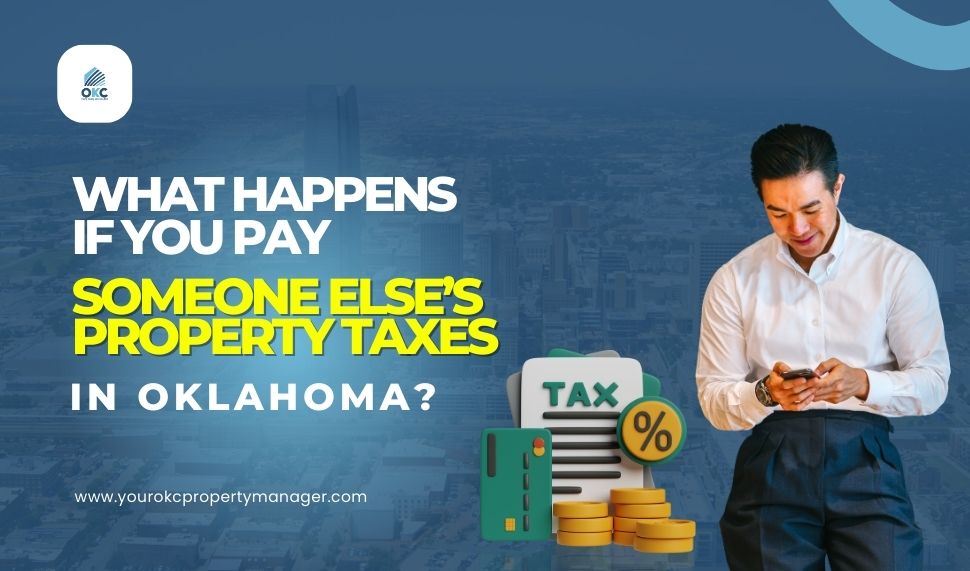Key takeaway: You can pay someone else’s property taxes, but it alone won’t give you ownership unless you complete the legal procedures required under Oklahoma law.
Imagine you spot a rundown house sitting abandoned in your neighborhood. The grass is overgrown, the windows are boarded up, and the mailbox is stuffed with unpaid bills. You run a quick check and discover the property taxes are delinquent. You might wonder: “What happens if I pay the back taxes on this property? Do I get to own it?”
In Oklahoma, this question comes up more than you might think, especially among savvy property investors looking to acquire properties at a discount. But the answer isn’t as simple as “pay the tax, own the house.” In this article, I will talk about the legal framework behind it, what rights (if any) you gain from paying someone else’s property taxes, and the risks and rewards involved.
Let’s walk through what really happens, step-by-step, if you pay someone else’s property taxes in Oklahoma.
Why Would You Pay Another Person’s Property Taxes?
There are several reasons you may choose to pay another person’s property taxes, including:
1. Protecting an Investment
As a landlord, you may consider paying taxes on a neighboring property to protect the value of your rental units. A neglected property with unpaid taxes can negatively impact neighborhood desirability and your ability to attract tenants.
2. Interest in Acquiring the Property
Oklahoma’s tax lien and tax deed sale processes provide an opportunity to acquire ownership of a property at a discount. By paying the taxes and following the correct legal procedures, you might be able to secure rights to the property through a tax deed.
3. Helping a Relative or Friend
Sometimes, you may help friends or family members by paying their property taxes temporarily to avoid legal issues like foreclosure.
What Do You Get If You Pay Someone Else’s Property Taxes?
This is where many Oklahoma landlords and new investors get confused. Simply paying off someone else’s property taxes doesn’t automatically grant you the ownership rights of the property. However, it helps you to initiate a legal process that can lead to property acquisition if handled correctly. Here’s what happens next:
1. You Receive a Tax Lien Certificate
Once you pay the overdue property taxes, you’ll be issued a tax lien certificate. This document serves as proof of your investment in the property.
2. The Property Owner’s Redemption Period Begins
Oklahoma law provides the property owner a 2-year redemption period during which they can repay the taxes (plus interest, typically between 8% and 10%) to retain ownership. If they fail to do so, you may initiate foreclosure proceedings.
3. You Can Initiate Foreclosure
After the redemption period expires, you have the option to foreclose on the property and potentially acquire the deed. This process involves filing a lawsuit to gain legal ownership. If successful, you’ll receive a deed to the property, effectively making you the new owner.
What are the Benefits of Paying Others’ Property Taxes?
From a landlord’s mindset, paying delinquent property taxes offers several potential benefits:
1. High Return on Investment (ROI)
If the property owner redeems the property, you earn interest on the amount paid, which can provide a solid ROI.
2. Acquiring Undervalued Properties
Foreclosing on properties with unpaid taxes can be a low-cost way to expand your real estate portfolio.
3. Preventing Property Decay
Keeping adjacent or nearby properties in good condition can help maintain the value of your rental properties.
What are the Risks and Considerations of Paying Someone Else’s Property Taxes?
As there are clear benefits, paying someone else’s property taxes isn’t without risk. Here are key factors to consider:
1. Legal Complexities
The foreclosure process in Oklahoma can be complex and time-consuming. You’ll need to follow strict legal procedures, including filing a lawsuit and notifying all interested parties. Failure to do so correctly may result in losing your investment.
2. Property Condition
You may end up acquiring a property in poor condition, which could require significant repairs and maintenance. It’s essential to research the property thoroughly before paying the taxes.
3. Redemption by the Owner
There’s always the possibility that the original owner will repay the taxes during the redemption period. While you’ll earn interest, you won’t gain ownership of the property.
What are the Steps to Safely Pay Property Taxes for Investment in Oklahoma?
If you’re considering paying someone else’s property taxes as an investment strategy, follow these steps to minimize risks:
1. Research the Property
Before paying delinquent taxes, ensure you know the property’s value, condition, and any existing liens or encumbrances. You can request property information from the county assessor’s office.
2. Understand Oklahoma’s Tax Lien Laws
Familiarize yourself with state-specific laws governing tax liens, redemption periods, and foreclosure procedures. Consulting a real estate attorney is advisable.
3. Monitor the Redemption Period
Keep track of the redemption timeline. If the owner redeems the property, ensure you receive your repayment plus interest promptly.
4. Prepare for Foreclosure
If the redemption period expires without repayment, be ready to initiate foreclosure proceedings. This involves legal costs, so budget accordingly.
Conclusion
Paying someone else’s property taxes in Oklahoma can be a smart investment strategy if you are looking to expand your rental portfolio. However, it requires careful research, an understanding of local laws, and a willingness to navigate legal complexities. Whether your goal is to earn interest or acquire new properties, ensuring due diligence is key to minimizing risks and maximizing returns.
If you’re a landlord in Oklahoma, keeping an eye on delinquent tax properties can open new opportunities for profitable investments—just be sure to consult a real estate professional or attorney before diving in.
Would you like help with property management or real estate investments in Oklahoma? Contact OKC Home Realty Services today for expert guidance!
FAQs: Paying Someone Else’s Property Taxes in Oklahoma
1. Can you claim ownership by simply paying the property taxes?
No, paying someone else's property taxes doesn’t automatically make you the owner. You must follow the legal process of obtaining a tax lien certificate and potentially foreclosing on the property after the redemption period.
2. How long is the redemption period in Oklahoma?
In Oklahoma, the property owner typically has a 2-year redemption period to repay the taxes and interest.
3. What happens if the owner never redeems the property?
If the owner doesn’t redeem the property during the redemption period, you can initiate foreclosure and potentially gain ownership.
4. Do you earn interest if you pay someone else’s property taxes?
Yes, if you buy a tax lien certificate. Oklahoma law allows lien holders to collect interest (usually 8–10%) if the property owner redeems.

Author
Scott Nachatilo is an investor, property manager and owner of OKC Home Realty Services – one of the best property management companies in Oklahoma City. His mission is to help landlords and real estate investors to manage their property in Oklahoma.
 (
(









